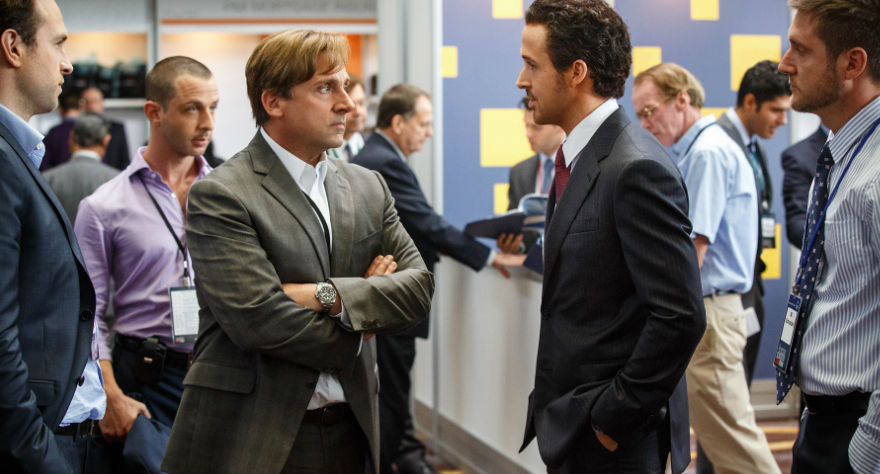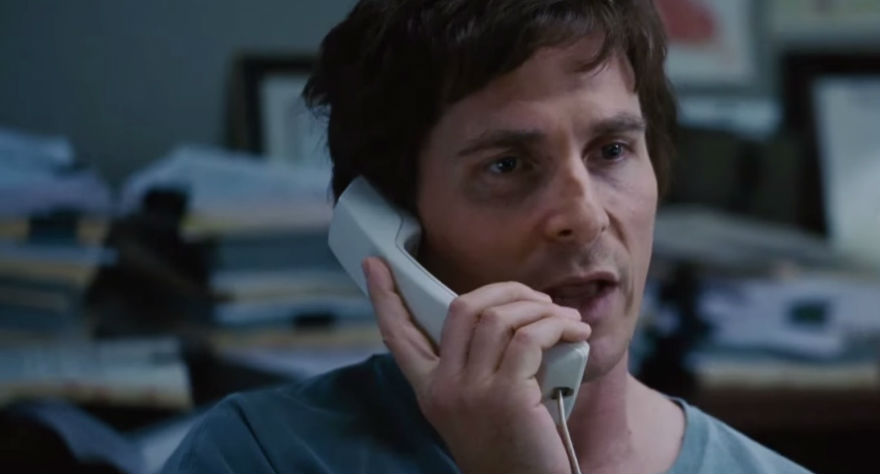Adam McKay Talks ‘The Big Short,’ Breaking the Fourth Wall, the Evolution of Steve Carell

In a drastic, surprisingly smooth departure from his typical work directing major studio comedies, Adam McKay tackles the dense subject matter of The Big Short, a screen adaptation of Michael Lewis‘ best-selling book about the devastating financial collapse of the mid-aughts. A heavy drama boasting an all-star ensemble (including Steve Carell, Ryan Gosling, Christian Bale, Brad Pitt, and more) playing men who watch the world burn to ashes around them from a credit and housing disaster only they saw coming, the film operates in a dark world of complex real estate jargon and impending Wall Street doom. Nevertheless, the film is imbued with a crackling, unpredictable energy a filmmaker with McKay’s comedic and improvisational background naturally brings to the table.
We spoke to McKay in a roundtable interview about the film, which opens this Friday in select cities and expands wide on December 23rd.

As a filmmaker, how hard or easy was it to maintain the balance of making sure your audience understands all of the Wall Street terminology while also being entertaining?
I think what we did with breaking the fourth wall was inspired by Lewis’ book. If you look at his book, he does a lot of footnotes where he says, “You’re still keeping up with what I’m saying. You deserve a gold star.” He kind of talks to the reader a little bit. That inspired us doing that in the movie. I just felt like the movies had to be inclusive. One of the ways the banks get away with ripping us off is by making us feel stupid or bored by financial talk. I wanted to open it up in a fun way because, once you get it, it’s a really energetic, exciting world. I figure if a college dropout who directed Step Brothers can understand it, the rest of the audience can. That was my operating premise. This isn’t that hard—it’s just moving dead money around and giving it weird names.
The balance is a different question. Ultimately I felt like this movie had to be driven by those characters. That’s what drove me through the book—Dr. Michael Burry, Mark Baum, Jared Vennett, the young guys. That’s the meat of this story. They’re us. They’re the people that the rest of the banking world doesn’t respect—they’re obnoxious, they’re weird. There’s also the big question of why they saw [the crisis] when no one else saw it. In the edit room, that was a big thing we looked at, balancing, trying to get the audience to have enough information so that you can go for the ride. But sometimes I’d have to stop the movie and go, “What the fuck is a synthetic CDO?” For the most part, the audiences really love it and feel like it pulls them into the movie more. The only people who have been bitching about it have been super stodgy film formalists.
You come from a theater/improv background where addressing the audience is quite common. Why do you think it’s considered such a radical idea in movies?
There’s definitely a snobbery about it that I’ve noticed. It’s a film school thing. In film school they teach you “show, don’t tell.” They literally do exercises with it. Friends of mine who were in film school talk about how you’d get in trouble if you’d tell and not show. I think it’s become this sort of unspoken rule. But some of my favorite movies of all time involve breaking the fourth wall or using narrators, like 24 Hour Party People. That’s a movie that I love. There’s such an energy to it. American Splendor. Scorsese’s done a bunch—Goodfellas, Casino. You freeze the frame, you talk. That new show, Narcos, does it a lot. I think it’s kind of changing. Early on, there was a power to film in the ’30s, ’40s and ’50s where they’re showing. They’re showing a lot. I think now, because there are so many mediums going on, we can blur it a little more. I’m less precious about it. I find it really exciting to [break the fourth wall].
You worked with four A-list actors on this movie. How much direction does each of them require, and are there different techniques you have to use with each of them?
You kind of dial into each actor and what they need. In the case of Bale, he comes to set and he is the character by the time he arrives. But he’s sort of internalized all of the guy’s physical tics and emotional outlook, but we’re trying to find the right pace for it and how much [he] lets out. Do you want to see a full tour de force of what the guy is in every scene? He and I worked a lot on when to use different aspects of the character. We were constantly having a discussion about that. Occasionally, the real Michael Burry’s voice will just get loud for no reason when he’s talking to you, so we talked about when to use that. It’s a constant checking-in with Christian. He’s completely grounded in the guy, but you try to find the right times and places and make sure it feels real.
Carell is very different. Carell almost hunts down the truthful moment like he’s got a pack of dogs. When he doesn’t have it, he gets very pissed at himself. He’s just chasing it and chasing it. When I do comedies with him, it’s not like that, but with this I realized my job was to be like his hunt-master. The two of us would just chase it down. You’re just nudging it and pushing it. When you get there, it’s very cool because he’ll never say “we got it,” but then suddenly, he’s silent. I’ll say “we got it,” and he won’t say anything and we’ll move on. He’s really, really hard on himself in a great way.
Gosling had an odd role in this movie. He’s both inside the movie and outside the movie. He can talk to the camera. So he was closer to a writer-director. The way we’d talk was closer to the way Will Ferrell and I talk. He’s a super collaborative, funny guy. Brad Pitt just came in with this fully formed character. He had the hair, the beard, the look. He knew exactly who this guy is. I was like, “Hey, I want to do this scene in the kitchen.” He was like, “Yup. I want to talk about saving seeds in Monsanto.” Melissa Leo lands, gets off the plane, smokes the scene in fourteen takes, says goodbye, gets on the plane and leaves. It’s like, “Where did that come from?!”
Coming from the world of making really big studio comedies, how easy or difficult was it to pitch yourself to take on a very different project?
You’re one hundred percent right. I’ve tried to make other movies. I tried to make Garth Ennis’ The Boys at one point, and I couldn’t get anyone to make it. That was a case where I went to all the studios in town and I could feel when I was pitching it [them thinking,] “Oh, he’s a comedy guy.” It was a tricky, ambitious project, but it didn’t help that I was a comedy guy in their eyes. In this case, I got very, very lucky. The company that I went to, Plan B, are the coolest people in the world. Really open-minded. The second I pitched my take they were like, “Why didn’t we think of this? This is perfect.” They were one hundred percent behind me from the beginning. And at that point, you have to put up or shut up about the script. When Paramount got the script, they actually liked it. Then we got this incredible cast, so we were good to go. I give all the credit in the world to Plan B for being open enough to talk to me about this. Not only open, but excited to talk about it.
How deeply involved were you with Michael Lewis in translating his book to screen?
Basically, I had lunch with him before we were going to get going. He said to me, “The book was my baby. You take the baby to college now.” He really loved the script. The greatest moment was when he saw our third-to-last screening and just went on and on about it and effusively loved it. Of course, we all reacted like giant geeks!
As a moviegoer, Steve Carell continues to surprise me as his career goes on. He’s always revealing new layers to his gifts. You’ve known him for years—has he always had these dimensions to him or is he really evolving with every project?
I think he’s definitely evolving. He’s got a little bit of Peter Sellers to him in the sense that he’s very meticulous and mathematical in the way he goes about comedy. It’s all very small, precise choices. I always knew he was a very detailed technician. But I don’t think I started thinking, “Oh, wait a minute—he can play these other ranges!” until Little Miss Sunshine. He was pretty frickin’ good in that, but then I thought, “Alright, he’s a good actor, but I’ve always known he was a good actor.” But then he did The Way Way Back. That was the first time I thought, holy shit—this guy’s really good. There’s this anger there and all these emotions. And then, of course, Foxcatcher blew me away. That’s how I ended up casting him in this role. I thought, son of a bitch, I think he can do this. He’s got the anger, he can transform enough. I was knocked over by what he does in this [movie].
What’s it like not working with Will Ferrell?
I can say this: Life is twenty percent less enjoyable. He came and visited us for, like, three or four days on set just because he wanted to hang. We had the best time with him. I always miss him. He’s the best! But I think it was good that we did something separate, you know? I actually was talking to him about doing a cameo, and he was like, “McKay, go do one without me!”
Talk about the pressure cooker of working with Paul Rudd on Ant-Man to craft what that movie became.
I gotta tell you—it didn’t feel like a pressure cooker. It felt like I was in heaven. I grew up on Marvel comics. I met with Kevin Feige and I could tell, “This guy gets it.” Sometimes you meet with these executives and it’s like, “They kind of get it…” The bummer of that is when you write something really cool and they don’t get it. It was so much fun knowing that, if we wrote something cool, Feige was going to get excited about it. We just had the best time, man. It was Rudd and I holed up in a room for two straight months, writing giant action sequences. Everyone assumed I was just doing the comedy, but we rewrote huge parts of that movie. [We got to write] the whole Falcon fight at the Avengers [base]. It was so much fun. I told Feige afterwards, “Any time you need me, give me a call. That was a blast.”
